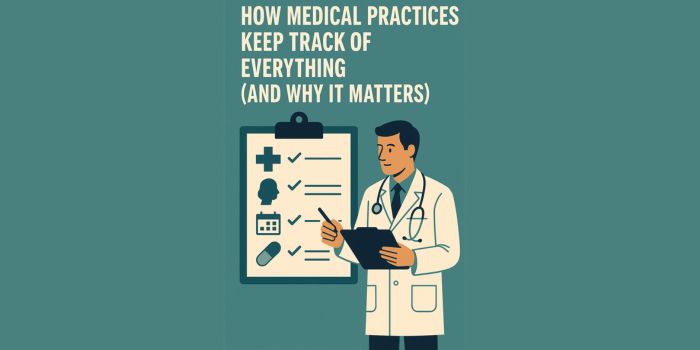Have you ever stopped to think about how much has to go right for you to have a doctor’s appointment? It must be on the schedule at a mutually available time. Insurance needs to be ran. History must be present. The bloodwork from last month needs to be found. Notes from that referral or prescription must be acknowledged.
Now extrapolate that over dozens (if not hundreds) of appointments and patients each day and you grasp the importance of the organizational aspect of medicine.
The Information Problem
Practices are flooded with massive amounts of information each day; much of it, needed at the exact right time.
Books upon books of medical histories, lists of prescriptions, information on all patients and insurance needs, notes from previous appointments, referral letters, follow up results – all need to be had, accessed, updated and need time sensitivity for all to work. Compounding this issue is the fact that much of medical information and oversight comes with privacy concerns unlike much of information tracking which makes it more challenging – and for wrongs committed with good intentions or without accountability.
Therefore, it’s not enough to have it collated; instead, it must be provided to the right person at the right time for it to matter. Your doctor should have your bloodwork results when you’re sitting in her office – not three days later after you’ve gone home and she’s forgotten what she wanted to tell you. This can be achieved through effective medical office support team who oversee; without them, things fall through the cracks and never make it to where they need to go.
Why Papers Aren’t Enough Anymore
Ten or fifteen years ago doctor’s offices were filled with charts on paper, filing cabinets, hand written notes. While some smaller practices still run this way, it’s painfully obvious how these systems can only limit operations when real information tracking is needed.
A chart can only be in one place at once; if your doctor has it in the examination room, the front desk cannot have access to it trying to answer a question about insurance. It gets misfiled. It gets misread from bad handwriting. It gets added, but maybe not at the right time.
Most importantly, without all information compiled in one digital setting, it’s almost impossible to understand patterns or catch needs before they turn into problems.
The Transition Into Digital Systems
For now, most practices have EHR systems which compile patient information as one digital file (to some extent). They have varying abilities and efficiency and effectiveness, however if a good one can be implemented and utilized, life changing take place.
Other support staff can access the same file at the same time if need be. Updates happen in real time. Reminders get sent about overdue screenings without anyone having to do so. Prescription refills can be electronically sent to a pharmacy without questions asked.
But only if those staffing understand how to use it; technology is only as good as its user. Digital systems are incredibly helpful only if information is added correctly and people know what they’re doing on the systems themselves.
The Problems When They Fail
When something goes wrong because of poor tracking systems within medical practices it’s not just inconvenient – it impedes care.
Patients miss appointments because no one told them they needed to come in. They have outpatient surgeries for which they haven’t fasted for eight hours because no one tracked their pre-op needs. They don’t get their prescription refills because somewhere, it had to go back to the doctor who prescribed it in the first place and that never got communicated in the proper manner. They get their bloodwork done but their other doctor needs those results too and they get lost in a black hole.
It’s all part of life; health insurance claims get denied because information was improperly documented – surprise bills come in because patients owe more than expected. Referrals expire because they don’t respond fast enough due to others failing to do their jobs in other offices – or worse, their own doctor’s office isn’t responsive enough. Medical histories are incomplete meaning patients explain themselves three times on a Wednesday alone because front desk staff failed to due due diligence for proper tracking in systems.
It’s not rare; it happens every day in practices who don’t have effective tracking systems in place.
For Multiple Providers Involved
And it’s even harder when multiple providers are involved for one person’s care.
The PCP orders bloodwork and hopes the lab processes it and sends it back (eventually). The PCP reviews lab results only to determine that a cardiologist should look into it; this means that a referral must be sent out. The cardiologist needs the same notes as much as the PCP needs notes from the cardiologist visit.
These transitions are always another potential hazard – notes aren’t sent, faxes (yes, even now medical offices use faxes) don’t go through. Follow up reports are lost in limbo never seen again.
Those who have effective tracking systems in place have policies for follow ups about all this – and more – pending referrals sent out, requested notes and yes, even reports from specialists who need the patient’s notes updated in their own files.
The Daily Work Done
Day in and day out there is endless behind-the-scenes effort in a medical practice that patients will never know about – unless something goes wrong.
They update medication lists when changes occur during follow ups; they document phone calls when someone has a question about symptoms or side effects well after someone left an appointment; they note someone canceled an appointment so they can reschedule; they document if labs were done onsite that day; they note if any other appointments made a difference; they confirm prior authorizations were obtained before any scheduled procedure begins.
When one thing happens it’s not significant but when compounded on a list, it makes or breaks a practice.
Why This Matters For Patients
When a medical practice has effective tracking systems – technologically savvy and staffing capable – everyone wins as patients get better care.
Appointments are made efficiently with proper prep; results are assessed as soon as possible and communicated just as rapidly; prescriptions are filled before patients run out; questions about insurance are answered before paperwork is useless; intercommunication happens between providers better than putting that responsibility on patients themselves.
When tracking fails – which it consistently does – frustrations abound about practices – and sometimes gaps in legitimate care occur negative results. Patients become their own case managers to ensure records went from Specialist A to PCP B instead of letting business-as-usual efforts handle getting it done themselves.
Keeping Quiet Behind The Scenes
Most patients don’t want to consider how well-organized their medical offices are until something goes wrong – a missed follow up request for an appointment due to lack of reminder systems – a random email requesting something about a prescription went overlooked – or a specialist who didn’t get a robust referral because someone failed to file paperwork along the way.
But those practices who’ve avoided such downfalls – and it’s more often than not – are not lucky – they have systems in place for adequate tracking with sufficient support staff that ensure everything’s covered based on technology and tracking.
Quality care rendered within a medical practice setting extends beyond a physician’s competencies; quality comes from an organized support system who ensures everyone has what they need when they need it.
When proper tracking is secured through technology tracked with sufficient staffing, everyone wins – from providers who can do their job by practicing instead of reading cobbled notes, support staff who aren’t stressed out and patients who receive quality care without gaps or corrections along the way.




